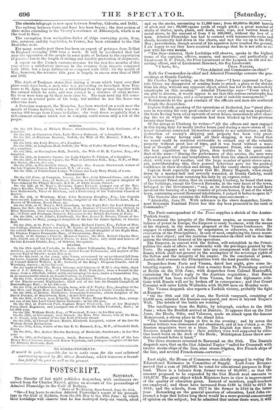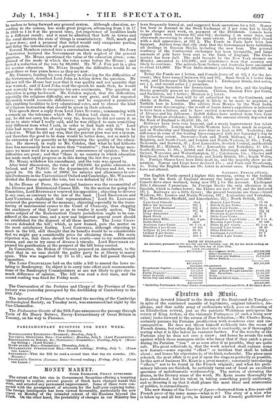Last night, the House of Commons was chiefly engaged in
voting the Educational Estimates in Committee of Supply. Lord JOHN Russxm, moved that a sum of 263,000/. be voted for educational purposes in Eng- land. There is a balance from former votes of 80,0001.; so that the amount proposed to be expended by the 31st March next amounts to 343,873/. The great object which Ministers have in view is improvement of the quality of education given. Instead of monitors, pupil-teachers are employed ; and these have increased from 6180 in 1852 to 6912 in 1853; and the schools, from 2277 in the former to 2546 in the latter year. Remarking on the general question of education, Lord John ex- pressed a hope that before long there would be a more generial concurrence of opinion on the subject; but he admitted that unless there were, it will
'be useless to bring forward any general system. Although education, ac- cording to the census, has made great progress, advancing from 1 in 17 in 1818 to 1 in 8 at the present time, yet experience of localities leads to a different result; and it must be admitted that both in towns and the rural districts the state of things is unsatisfactory. Still, much good is now done ; and a proposal that failed would only exasperate parties, and delay the introduction of a general system. Several Members entered into a conversation on the subject. Sir JOHN BAKINGTON lectured the Government on their neglect of the general question. Mr. Mum. questioned the value of the education given; com- plained of the mode in which the votes come before the House ; and moved a reduction of the vote by 80,000/. Mr. W. J. Fox put in a plea for secular education. Mr. MILES thought the difficulties would be as great three or four years hence as they are now. Mr. COBDEN, lauding his own charity in allowing for the difficulties of the Government, described Lord John as letting down the question. He did not tell the House last year that it was quality and not quantity that was wanted ; and if Lord John read the speech he made then, he would now scarcely be able to recognize his own sentiments. The question of education is going backward. Mr. Cobden argued, that the difficulties, especially the religious difficulty, are not very great, and that repeated discussion would reconcile differences; and he suggested a permissive bill, enabling localities to levy educational rates, and to choose the kind of religious instruction that should be given in their schools.
This speech drew a reply from Lord Joan Russ= ; commencing with a remark on the tolerance which Mr. Cobden laid claim to. "I must say, he did not carry his charity very far, because be did not carry it so far as to state what I really said, and he was obliged to state something very different from what I said, in order to find fault with it." Lord John had never dreamt of saying that quality is the only thing to be looked to. What he did say was, that the present plan was not a system, and therefore the good to be done would be better done, not so much by the extension of the quantity as by improving the quality of the educa- tion. He showed, in reply to Mr. Cobden, that what be had hitherto done has necessarily been no more than " tentative" ; that for large mea- sures we must wait for a more general concurrence of opinion; that the difficulties are great ; and that "there is no country in which education has made such rapid progress as in this during the last five years."
Mr. MIALL withdrew his amendment, and the vote was agreed to.
After brief discussions, the votes of 193,040/. for public education in Ireland, and of 79,845/. for the departments of Science and Art, were agreed to. On the vote of 2006/. for salaries and allowances to cer- tain Professors in the Universities of Oxford and Cambridge, Mr. WILLIAMS divided the House against the vote, but was defeated by 154 to 25.
In the House of Peers, the principal business was the recommittal of the Divorce and Matrimonial Causes Bill. On the motion for going into Committee, Lord REDESDALE renewed his opposition ; objecting to divorce in any case, as contrary to the law of the land. [Lord BROUGHAM and Lord CAMPBELL challenged that representation.] Lord Sr. LEONARDS reviewed the provisions of the measure ; objecting especially to the trans- ferring of matrimonial causes to the Court of Chancery, thus clogging the machinery of that Court so as to render it nearly useless. The entire subject of the Ecclesiastical Courts jurisdiction ought to be con- sidered at the same time, and a new and improved general court should be established for the disposal of all these matters. The LORD CHAN- CELLOR defended the bill ; which, as now framed, puts the matter on the most satisfactory footing. Lord Csairunm,, although objecting to much in the bill, still thought that its benefits would be so considerable that we might pay a considerable price for obtaining them. HM main objection was, that there should be two courts-one to try matrimonial causes, and one to try cases of divorce a vinculo. Lord BROUGHAM ex- pressed his gratification at the prospect of the bill being carried.
In Committee, the Bishop of Oxronn proposed an amendment, to the effect that in no case should the guilty party be at liberty to marry again. This was negatived by 25 to 10; and the bill passed through Committee.
The Lorin CHANCELLOR laid on the table a bill to amend the laws re- lating to Bankruptcy. Its object is to carry into effect such recommenda- tions of the Bankruptcy Commissioners as are not likely to give rise to much difference of opinion. The bill was read a first time, and the second reading was fixed for Friday next.



































 Previous page
Previous page